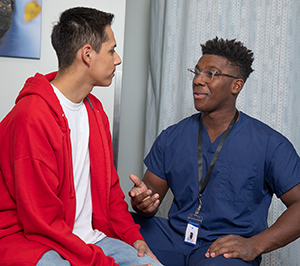For Teens: Get Checked for STIs
Remember: Any kind of sex puts you at risk for sexually transmitted infections (STIs). You may also hear them called sexually transmitted diseases (STDs). Look for signs of STIs on you and your partner. Get checked if you’re not sure. And if you do have an STI, it's very important to get treated! Tell your partner so they can get checked, too.

Gender words are used here to talk about anatomy and health risk. Please use this information in a way that works best for you and your provider as you talk about your care.
Look for symptoms
Not all STIs have symptoms you can see. For example, chlamydia usually has no or only mild symptoms. But knowing common signs, such as irritation and pain, will help. Pay attention to your body and your partner’s body. If either of you see or feel something that seems like a symptom, get checked.
Get checked
Getting checked is the only way to know for sure if you have an STI. You can get tested at a health clinic or healthcare provider’s office. Tests may include:
-
Physical exam
-
A sample (swab) of the penis, vagina, mouth, or rectum
-
Urine tests. These have largery replaced the penis swab.
-
Blood tests
-
HIV testing by blood test, finger stick, or oral swab
-
A sample of tissue, cell, or saliva
-
A pelvic (vaginal) exam or rectal exam
Get treated
Many STIs can be cured or treated and cured with medicine. Early treatment can help control the further spread of an STI and keep things from getting worse. There is a risk of pelvic inflammatory disease (PID) in untreated females. This can lead to infertility. Follow all your instructions for treatment. And remember to:
-
Not have sex for as long as you’re told. If the infection is not completely gone, you could infect someone else.
-
Take all your medicines. And don’t share medicines with your partner unless you’re told to.
-
Go back to your healthcare provider or clinic if your symptoms don’t go away (or if they come back).
-
Get treated for each STI you have.
Talk to your partner
If you have an STI, tell your partner so they can get checked. It may be embarrassing. But if you don’t talk about it, your partner could end up having serious health problems. They could also pass the disease back to you or on to others. If you’re not sure what to say, ask your healthcare provider or nurse.
Treatments to prevent an HIV infection are also available. Talk with your healthcare provider about prevention options if you are sexually active or have been diagnosed with an STI in the past.
Online Medical Reviewer:
Dan Brennan MD
Online Medical Reviewer:
Sabrina Felson MD
Date Last Reviewed:
9/1/2025
© 2000-2026 The StayWell Company, LLC. All rights reserved. This information is not intended as a substitute for professional medical care. Always follow your healthcare professional's instructions.